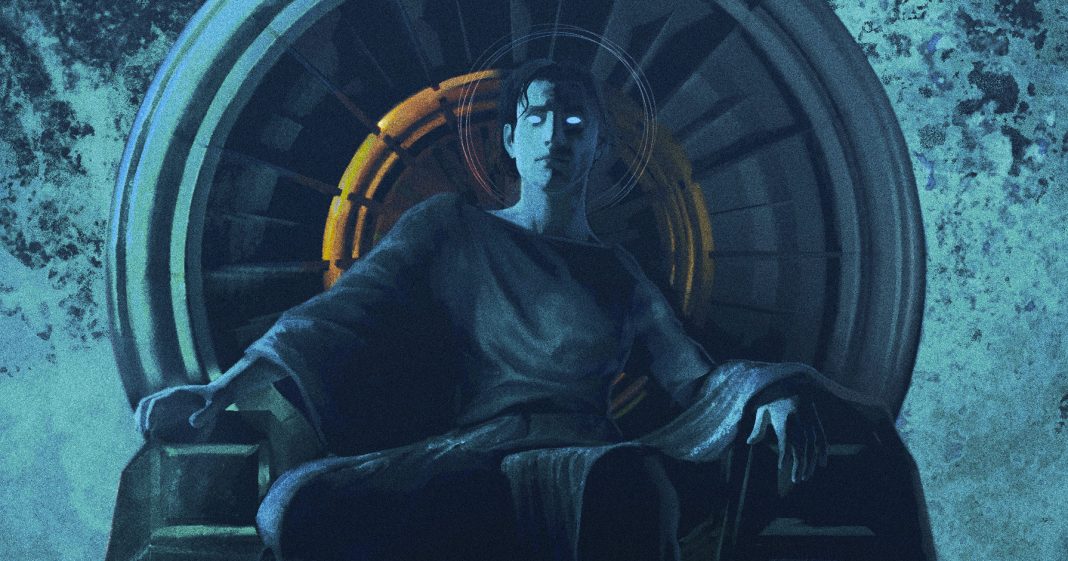The 1969 novel Dune Messiah is a sequel to Frank Herbert’s sci-fi classic Dune. TV writer Andrea Kail is a diehard fan of the original Dune, but has always found the sequel disappointing.
“Overall, as a book, it just feels like it’s very unformed,” Kail says in Episode 537 of the Geek’s Guide to the Galaxy podcast. “It just felt like, ‘These are the ideas, and I put these ideas down, and here’s a first draft. Now let’s go back and fix it.’ And then, no, never went back to fix it.”
Dune Messiah picks up 12 years after the original novel, when the young hero Paul Atreides has become a despotic emperor. Geek’s Guide to the Galaxy host David Barr Kirtley loved the concept of the book, but felt that Paul’s supernatural powers made the story less exciting than it might have been.
“The reason I wanted to read this is because I was really fascinated by this idea that you take the messiah hero from the first book that everybody loves and show him having flaws and becoming a bad ruler,” he says. “But I was a little disappointed in that I felt like Paul wasn’t actually flawed. Because he has no choice, because he’s doing his best to try to avoid the worst futures he can see, I felt like that made it less interesting than if he was actually making choices and succumbing to the temptations of power.”
Science fiction author Rajan Khanna enjoyed the book despite its flaws, and says that certain scenes from it are still burned into his brain from the first time he read it. “It doesn’t live up to the first novel, but I also think it’s really hard for anything to live up to that novel, because it’s one of my favorite novels of all time,” he says. “But I do think that there’s a lot of cool stuff in there.”
Science fiction author Matthew Kressel had mixed feelings about Dune Messiah, but that hasn’t dimmed his enthusiasm for the Dune series as a whole. “The universe that Herbert created is amazing,” he says. “I had a little bit of a problem with the execution. The first two thirds it’s kind of slow, but then it picks up in the last third. I have some problems with the ending, but still I’m excited to continue reading the next book.”
Listen to the complete interview with Andrea Kail, Rajan Khanna, and Matthew Kressel in Episode 537 of Geek’s Guide to the Galaxy (above). And check out some highlights from the discussion below.
Andrea Kail on reading Dune Messiah:
Dune is one of the books that made me want to be a writer. It was one of the three foundational books of my childhood that formed who I was. And so I read it when I was maybe about 13 or 14 and just gobbled it up. And of course, the first thing you do when you finish a book that you love is you go run for the sequel. So I ran for the sequel, and I read Dune Messiah, and it was not the same. It was a very different experience. It was very perplexing. It was depressing. I just didn’t know what was going on. And I read them all—I went on to read the next two that were available at the time—but it just kind of put me off the whole thing, so to speak. So coming back to it now, I was hoping for a different experience, reading it again as an adult. And I didn’t actually get that. It was sort of the same experience.
Matthew Kressel on point of view:
So much [in Dune Messiah] happens off-screen, which is kind of crazy when you think about it, because Herbert does this point-of-view switching in the middle of the page, which almost no writer does today—or at least in speculative fiction that I read, I hardly ever see that point-of-view switching. And what I mean by that, if people aren’t clear about it, is that you’re in someone’s head and then you’re immediately in someone else’s head on the same page. Most writers, they’ll put either a scene break or a chapter break to switch that, but Herbert doesn’t do that. So it’s not like he can’t be in their point of view when this happens, he just decides not to.
David Barr Kirtley on female characters:
I thought all the female characters were not well deployed in this novel. I’ll just talk about Alia a little bit. She’s a young teenager at this point in the story, but she was born with the knowledge and memories of this whole line of wise old women. And she just acts like a teenager. It was such a weird characterization of her, given what’s established about her, that her mind has this whole archive of all these different lives and wisdom. But it seems like that doesn’t affect her characterization almost at all, in a way I found really, really odd.
More Great WIRED Stories
Go Back to Top. Skip To: Start of Article.
